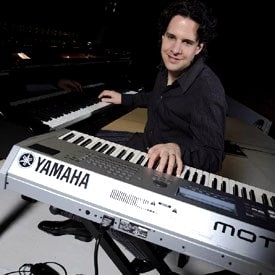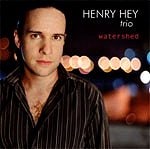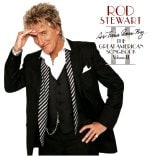Jazz Pianist Henry Hey and Rocker Rod Stewart "Meet in the Middle" on Album of American Standards
BUENA PARK, CA (May 17, 2004) — The millions of fans who have followed Rod Stewart's long pop/rock career might scratch their heads to see him performing classic tunes from Duke Ellington, George Gershwin and Cole Porter. Fewer people are familiar with Yamaha jazz pianist Henry Hey – for now – but they might be excused for having the same reaction. Yet these two artists have come together for an album that celebrates these pre-rock hits, and have taken them on the road on a 44-city North American tour, "From Maggie May to the Great American Songbook." As if that weren't enough, Hey is also garnering enthusiastic reviews for the first CD from his self-named jazz trio. Watershed [Sirocco Jazz Limited], released in September 2003, features Hey on piano with John Hebert on bass and Jochen Rueckert on drums. Hey came to the project after years as a sought-after accompanist for other artists, including Jeff "Tain" Watts, Kenny Wheeler, Bill Evans, Til Broenner and Seamus Blake. In reviewing Watershed, JazzReview.com's John Kelman called the CD "an auspicious first recording" that "should go a long way in establishing Hey as a musical force in his own right." AllAboutJazz.com's Phil DiPietro called Hey "a young pianist of refined technique and sensibility," and predicted "his future as an elite member of the modern-day fraternity of the piano trio," while in the same publication, Alexander M. Stern concludes, "Hey points to the bleachers and quite casually belts one out of the park." |
"Watershed is a synonym for a turning point," says Hey. "I thought it was an appropriate title because I've been fortunate to spend a lot of time with music in a lot of settings, and I finally got to a place where my own compositional voice was loud enough in my head that I wanted to record it." Fresh off a fall 2003 Canadian tour with Billy Kilson, Hey made two weeks of European appearances with his trio in support of Watershed, then played some bigger dates from February through April with Stewart to back up the CD As Time Goes By...The Great American Songbook: Volume II [J Records, 2003]. Hey played piano on the album for familiar tunes such as "I'm in the Mood for Love," "Don't Get Around Much Anymore" and, in a duet with Queen Latifah, "As Time Goes By." The two artists first joined forces during the follow-up to Stewart's first standards album, It Had to Be You… The Great American Songbook (J Records, 2002), when Hey sat in with Stewart's band during several live television gigs promoting the release. Since neither the American songbook bent of Stewart's new disks nor the rocker's more established style seem to fit Hey's East Village, jazz-classical background, he admits this collaboration represents something of a "meeting in the middle." |
"I think that's probably a fair assessment of what you're seeing there," he says. "Although my work in New York has been primarily jazz, I've certainly been involved in a fair amount of pop music, R&B and rock and roll. It wasn't a foreign experience to work with somebody like Rod." This time around, Hey is on the album itself as well as on the TV appearances; he joined Stewart in January spots on The Late Show with David Letterman, The Tonight Show, Good Morning America, The View, The Sharon Osbourne Show and Ellen: The Ellen DeGeneres Show. "I've gotten to know Rod to some degree, and he's a wonderful person to work with," Hey remarks. "He's one of the most genuine star performers I've ever worked with; he really does know the music, he enjoys and he spends time listening to it." Hey recently joined the ranks of Yamaha affiliated artists, but he has actually owned a C3 6'1" grand piano for several years prior to that relationship. "It's been my daily tool for writing and practicing all this time," he says. For the Rod Stewart tour, he's using a DC6A 6'11" Disklavier grand piano and a MOTIF synthesizer provided by Yamaha. "We're using the MIDI portion of the DC6A for controlling a few other parts," he says. "Of course, it's a fantastic instrument without that, one I like to have on the stage. It's very consistent and durable; that's why it's found in so many recording studios. It holds its tune very well, and I think it has a very nice, clear tone for recording and live performance." "I'm doing a lot of keyboard parts with the MOTIF," he notes. "As well as the standards, we're also doing a bunch of Rod's classic pop and rock hits on the tour, so I'm taking some part in that. It was pretty exciting for me once we started playing that stuff – certainly learning his music on the level where he's used to hearing it was a bit of a challenge, where everyone knows it and doesn't give it a second thought. Like the piano, the MOTIF is a well-manufactured machine; it has a very nice feel, and the sounds are clear, high-quality samples. That's enough to sell me on the instrument." Stewart's "From Maggie May to the Great American Songbook" tour kicks off its summer leg on July 1 in Orlando, Florida. Hey is currently writing new music for his June Trio dates in London, recording with bassist Hans Glawisnig for his upcoming record, and performing with The Owen Howard and Tom Beckham Bands. More information on Henry Hey's career and music is available online at www.henryhey.com, and the full itinerary of Rod Stewart's tour is available at www.rodstewart.com. Both artists' recent albums are available online and in retail outlets nationwide. For more information about Yamaha pianos and synthesizers, write Yamaha Corporation of America, Piano Division, P.O. Box 6600, Buena Park, CA 90622-6600; telephone (714) 522-9011; email infostation@yamaha.com; or visit www.yamahasynth.com.
|




